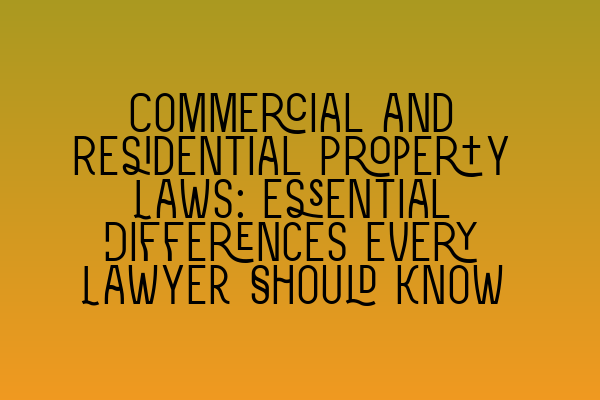Commercial and Residential Property Laws: Essential Differences Every Lawyer Should Know
When it comes to property laws, there are distinct differences between commercial and residential properties. As a lawyer practicing in property law, it is essential to understand these differences to provide the best legal advice and representation to your clients. In this blog post, we will explore the key distinctions between commercial and residential property laws.
Difference in Purpose and Use
The primary difference between commercial and residential properties lies in their purpose and use. Residential properties are designed for individuals and families to live in, providing a place of shelter and privacy. On the other hand, commercial properties are intended for business purposes, such as offices, retail stores, or factories.
Understanding the distinct purposes and uses of these properties is crucial, as it impacts various aspects of property law, including leasing, zoning regulations, and landlord-tenant relationships.
Lease Agreements
Lease agreements for commercial and residential properties differ significantly. Commercial leases tend to be more complex and extensive compared to residential leases. This is because commercial properties often involve long-term agreements, higher rents, and specific provisions related to business operations.
Residential leases, on the other hand, are typically shorter-term agreements and focus more on housing and tenancy rights. These leases often cover basic provisions, such as rent, maintenance responsibilities, and rules regarding pets and noise.
Lawyers specializing in property law should have a thorough understanding of lease agreements for both commercial and residential properties to ensure their clients’ rights and interests are protected.
Regulatory Framework
Commercial and residential properties are subject to different regulatory frameworks. Residential properties are primarily governed by local housing laws, which aim to provide adequate housing, protect tenants’ rights, and ensure safety standards are met.
Commercial properties, on the other hand, are governed by a broader range of regulations, including zoning laws, health and safety regulations, environmental laws, and fire codes. Understanding these regulations and how they impact commercial properties is crucial for property lawyers to advise their clients effectively.
Dispute Resolution
Another crucial difference in commercial and residential property laws lies in the dispute resolution process. Disputes arising from residential properties often involve issues such as non-payment of rent, repairs, or eviction procedures. These disputes are typically handled through landlord-tenant courts or housing tribunals.
Commercial property disputes, on the other hand, can be more complex due to the business nature of the properties involved. These disputes may involve issues such as contract disputes, breach of lease agreements, or property damage claims. Commercial property lawyers need a deep understanding of contract law and business regulations to effectively resolve these disputes.
Conclusion
Understanding the essential differences between commercial and residential property laws is crucial for lawyers practicing in property law. By understanding these distinctions, lawyers can provide the best advice and representation to their clients, whether they are dealing with residential or commercial properties.
If you are considering a career in property law or are already a lawyer looking to enhance your knowledge, SQE Property Law & Land Law offers a range of preparation courses for the SQE exams. Make sure to check out our related articles for more information on SQE exam practice, preparation courses, and exam dates.
Related Articles:
